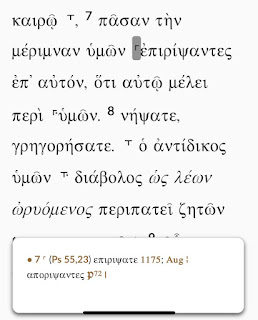With the permission of Maurice Robinson, I am making available one of Pierpont’s unpublished papers, an evaluation of E.F. Hills’ defense of the textus receptus. Some formatting may have changed a bit, but I include here both text (to make it searchable) and images of the paper itself (for transparency).
Edward F. Hills’ Views on the N.T. Text
[by William G. Pierpont]
Dr. Hills’ agenda is openly and clearly expressed in the title of the four editions of his book “THE KING JAMES VERSION DEFENDED,” of which this reviewer used the first (1956) and the second (1973), together with several items of personal correspondence (the last dated 10 June 1981, shortly before his death). During this period his basic premises and conclusions remained resolutely unaltered, although expressed in somewhat different ways.
His reverence, sincerity, integrity and scholarship are unquestioned. His presentation of facts is balanced, fair and precise, and often interestingly made. It is his interpretation and use of the facts, as well as certain presuppositions which we must examine.
Starting from the confidence that God is the God of truth, he lays out his two primary principles as:
a) the autographs of the NT were Divinely inspired, and therefore infallible, and that b) because of this God must see that they were providentially preserved. (The logic for this step rests on Mt. 5:17+, 24:35, etc.)
Therefore, textual criticism of the Scriptures is different from that of other books. Its principles must be drawn from Scripture itself—and from creeds and other Church writings which are in agreement with Scripture—and used in constructing theories for criticism itself.
Providential Preservation (PP) forms the center about which his further presentation revolves. Summarizing his "axioms", he declares that:-
1) The purpose of PP is to preserve the infallibility of the autographic text, and that God must have done so in a public way, i.e., so that all may know where and what it is-- not hidden somewhere among the MSS and requiring to be searched out.
2) It is the Greek text which is thus preserved, not a translated version of it. (God never promised that a translation would be kept free of errors, great or small.) Further, there may not be competing authorities.
3) During the long centuries of hand copying, PP operated through the Greek-speaking Christian community, who understood and used the language.
4) PP operated through the testimony of the Holy Spirit: only through Bible-believing universal Christian preiesthood [sic], those who have taken a supernatural view of the text, applying to it standards of judgment directed by the Holy Spirit, and were thus enabled to distinguish the true from the false. This was not only through the Spirit’s testimony to the individual’s soul, but also in the collective priesthood of believers through the ages (continuing onward into the Protestant period). Thus errors entering were weeded out by Divine Providence and guidance.
5) From the very first, PP supplied a multitude of trustworthy copies which were read and recopied, while faulty and untrustworthy ones fell out of use and passed into oblivion. Thus the genuine text was kept safe in the vast majority of MSS.
6) Thus the consensus agreement of this vast majority of copies forms the Traditional Text (TT), which accurately represents the originals and is the Standard Text.
This vast majority of MSS thus contains an essentially uniform text, although hardly any two MSS agree exactly throughout by reason of little individual variations and errors. Their differences are often hard to detect, being rare and small. This verifies that each descended independently from its own ancient ancestor, and therefore the text itself is ancient and not medieval in origin.




